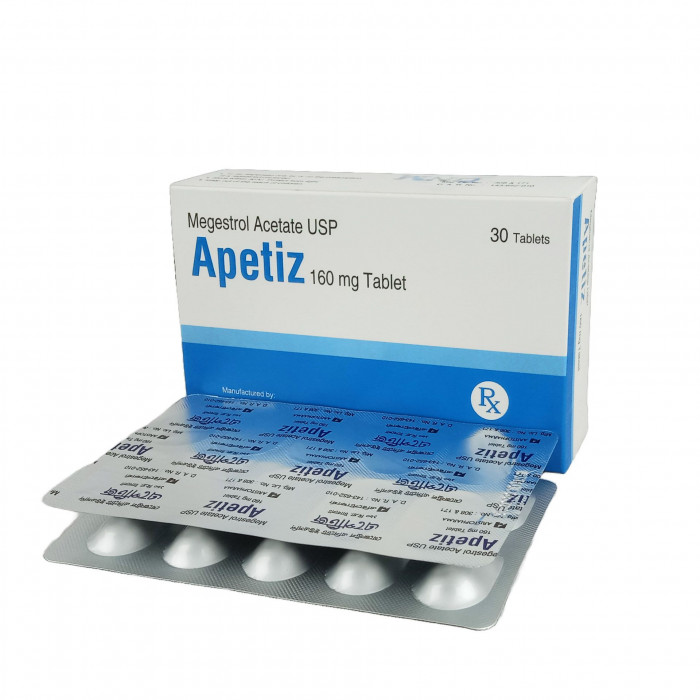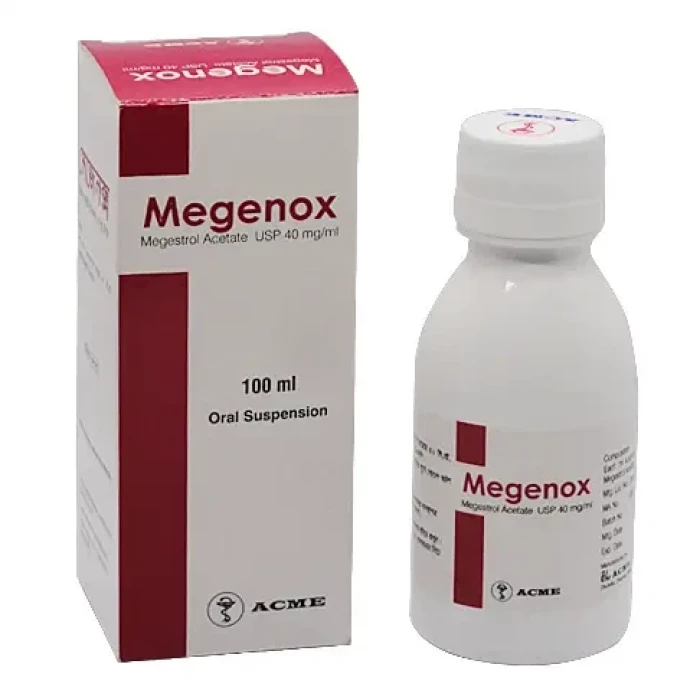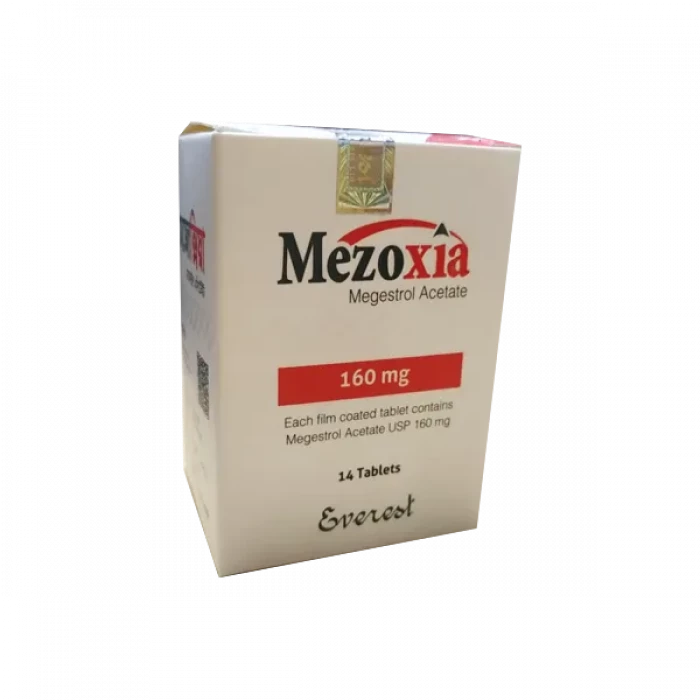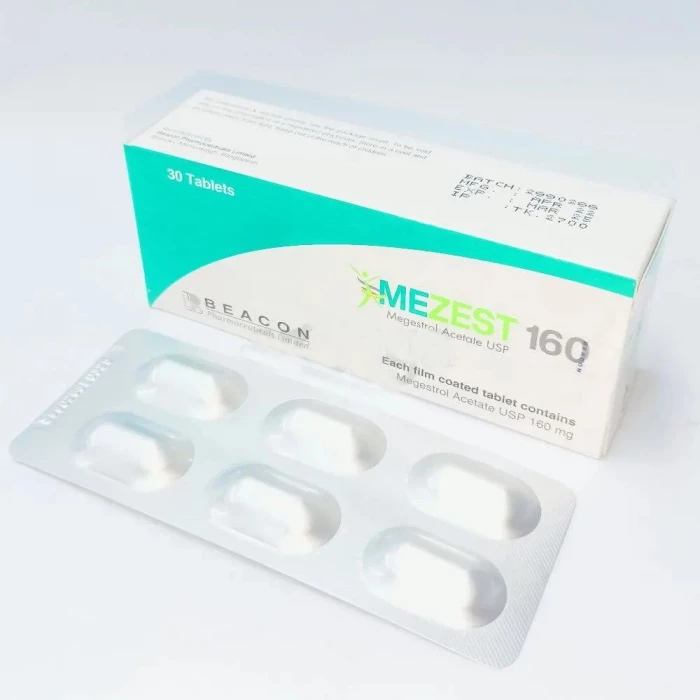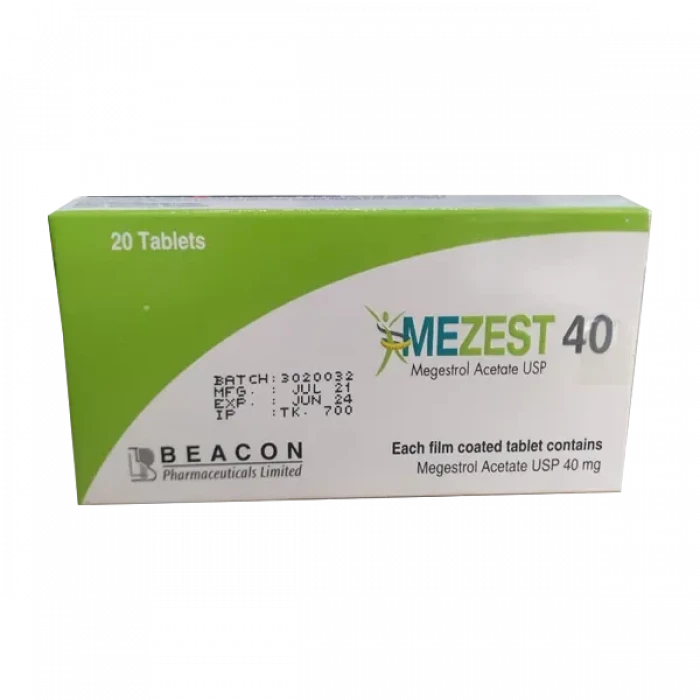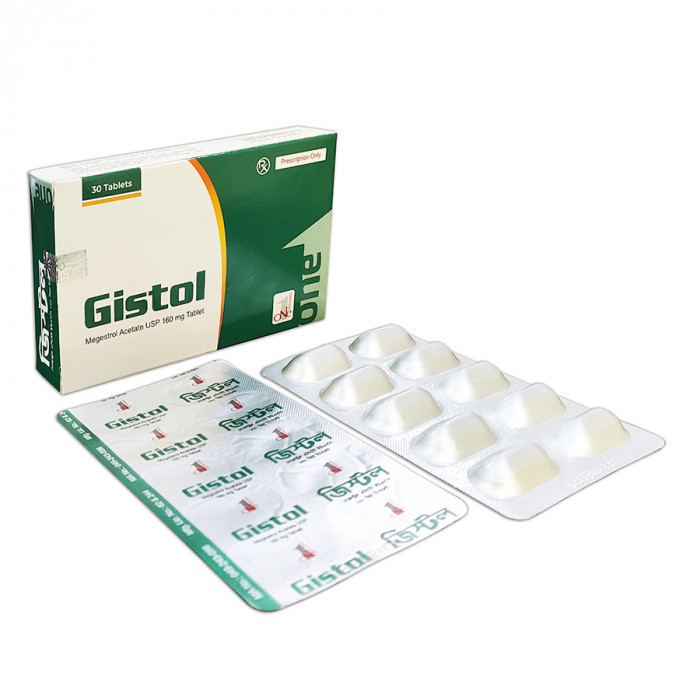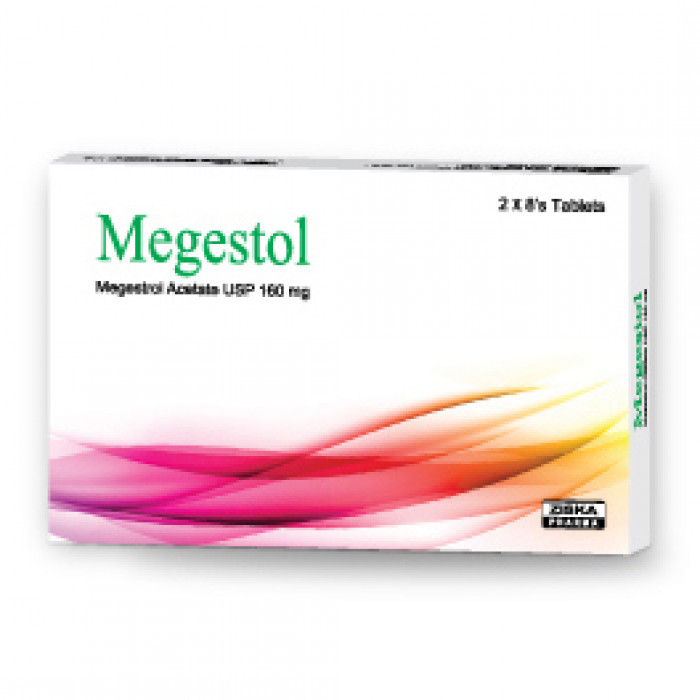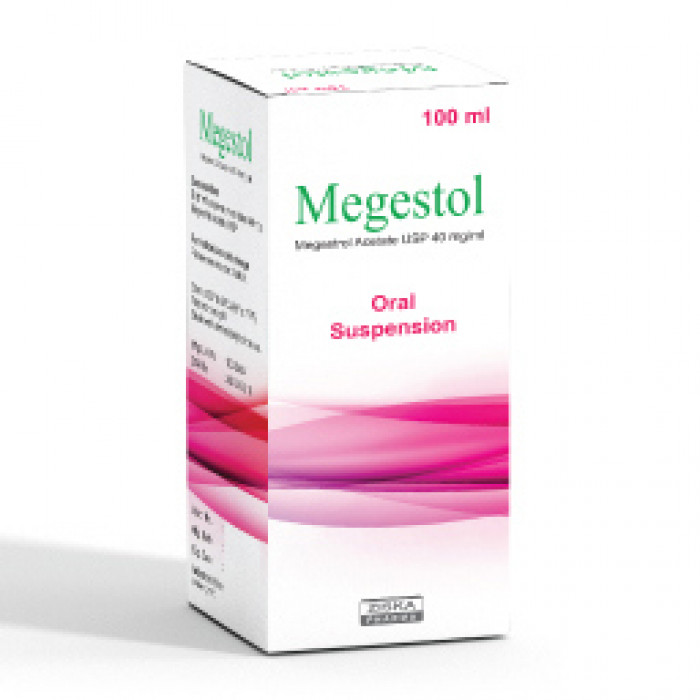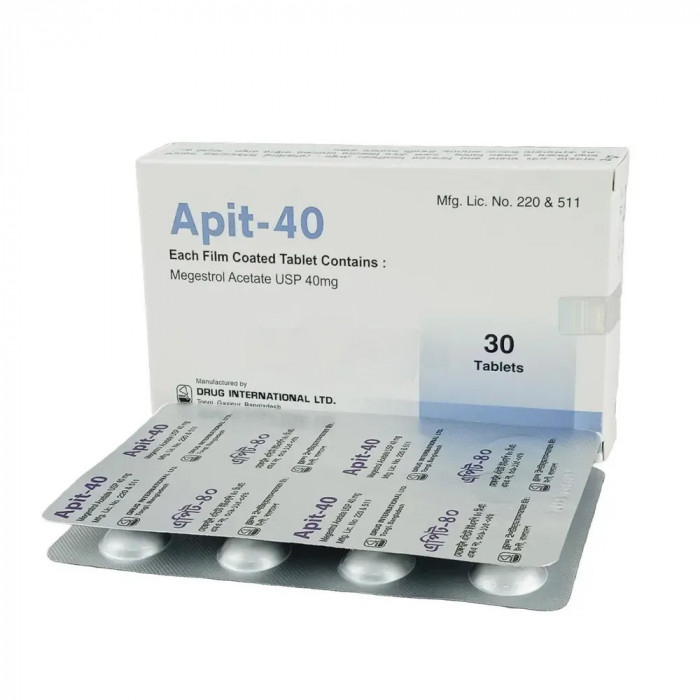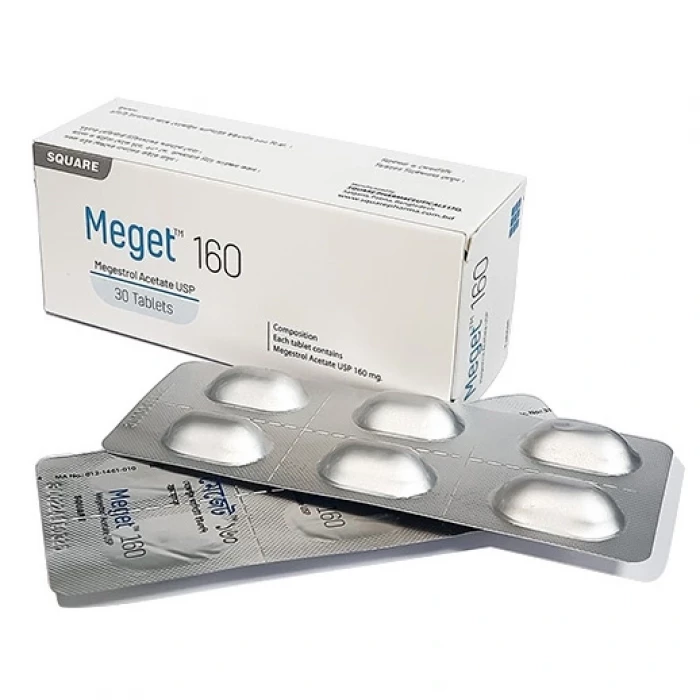
✔ 100% Authentic Product
👁️ Currently Viewing 2080
Meget 160mg Tablet 6pcs
Megestrol Acetate is a synthetic antineoplastic and progestational agent. The exact mechanism of its antineoplastic activity in endometrial carcinoma is unclear but may involve:
- Inhibition of pituitary gonadotropin secretion, leading to reduced estrogen production.
- Direct cytotoxic effects on tumor cells and modification of steroid hormone activity in breast cancer.
In metastatic cancers, hormone receptors may vary across tissues. Estrogen binds to cytoplasmic receptors in target cells, enters the nucleus, and triggers gene transcription, altering cell behavior. Megestrol Acetate in pharmacological doses:
- Reduces hormone-dependent human breast cancer cell populations.
- Counteracts estrogen's stimulatory effects on these cells.
Discount
Price: ৳ 456
MRP:
৳
480
5%
Off

100% Genuine Products, Guaranteed

Safe & Secure Payments, Always

Fast, Secure & Efficient Delivery

Proper Packaging
 Cash on Delivery - All over Bangladesh
Cash on Delivery - All over Bangladesh Regular Delivery - 12-24 Hours, Dhaka City* Charge Tk.39-59
Regular Delivery - 12-24 Hours, Dhaka City* Charge Tk.39-59 Regular Delivery - 24-48 Hours, Other Cities* Charge Tk.99-110
Regular Delivery - 24-48 Hours, Other Cities* Charge Tk.99-110
🌙 রমযান অফার 🌙
 ফ্রি ডেলিভারিঃ - ৭৯৯ টাকা+ অর্ডারে, ঢাকা
শহরে
ফ্রি ডেলিভারিঃ - ৭৯৯ টাকা+ অর্ডারে, ঢাকা
শহরে ফ্রি ডেলিভারিঃ - ২৭৯৯ টাকা+ অর্ডারে, ঢাকার
বাহিরে
ফ্রি ডেলিভারিঃ - ২৭৯৯ টাকা+ অর্ডারে, ঢাকার
বাহিরে
📲 মোবাইল অ্যাপ অর্ডারে সাশ্রয় বেশী
-
Google Play Store থেকে ডাউনলোড
-
Apple Store থেকে ডাউনলোড
100% Genuine Products, Guaranteed
Safe & Secure Payments, Always
Fast, Secure & Efficient Delivery
Proper Packaging
 Cash on Delivery - All over Bangladesh
Cash on Delivery - All over Bangladesh Regular Delivery - 12-24 Hours, Dhaka City* Charge Tk.39-59
Regular Delivery - 12-24 Hours, Dhaka City* Charge Tk.39-59 Regular Delivery - 24-48 Hours, Other Cities* Charge Tk.99-110
Regular Delivery - 24-48 Hours, Other Cities* Charge Tk.99-110 ফ্রি ডেলিভারিঃ - ৭৯৯ টাকা+ অর্ডারে, ঢাকা
শহরে
ফ্রি ডেলিভারিঃ - ৭৯৯ টাকা+ অর্ডারে, ঢাকা
শহরে ফ্রি ডেলিভারিঃ - ২৭৯৯ টাকা+ অর্ডারে, ঢাকার
বাহিরে
ফ্রি ডেলিভারিঃ - ২৭৯৯ টাকা+ অর্ডারে, ঢাকার
বাহিরে- Google Play Store থেকে ডাউনলোড
- Apple Store থেকে ডাউনলোড
🌙 রমযান অফার 🌙
📲 মোবাইল অ্যাপ অর্ডারে সাশ্রয় বেশী
✅ Description:
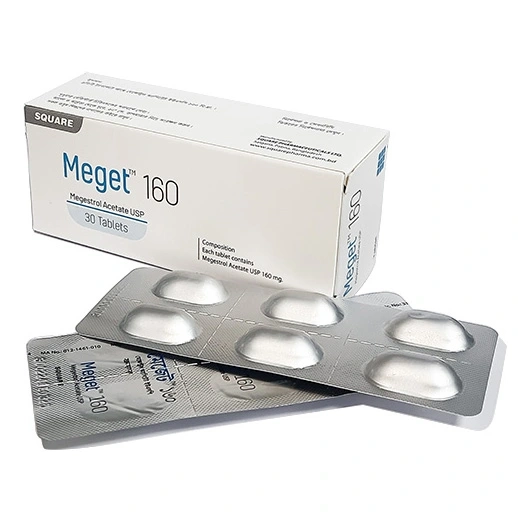
✔️ Pharmacokinetics:
- Peak plasma concentration: Achieved 2–3 hours after a single 160 mg oral dose.
- Plasma half-life: 33–38 hours.
- Excretion: ~66% via urine, ~20% via feces.
✔️ Side Effects
- Weight Gain: Common and typically linked to increased appetite rather than fluid retention.
- Thromboembolic Events: Includes thrombophlebitis and pulmonary embolism, which may be fatal in some cases.
- Glucocorticoid Effects:
- New or worsening diabetes mellitus, Cushing’s syndrome, and adrenal insufficiency (during or after MEGET therapy).
- Other Side Effects:
- Nausea, dyspnea, tumor flare, hyperglycemia, glucose intolerance, alopecia, hypertension, mood changes, hot flashes, lethargy, rash, and sweating.
✔️ Breast cancer:
- Breast cancer: 160 mg/day.
- Endometrial carcinoma: 40–320 mg/day in divided doses.
- A minimum of 2 months of continuous treatment is necessary to assess efficacy.
Pediatric Use: Safety and efficacy have not been established in children.
Geriatric Use: Limited data is available for patients aged 65 and older, making it unclear if they respond differently from younger individuals.
✔️ Drug Interactions
With other medications:
- Potential interactions have not been thoroughly studied.
With food/other substances:
- Estrogens and progestogens can cause fluid retention, especially at high doses or with prolonged use. Patients with preexisting fluid retention issues should use Meget cautiously.
✔️ Contraindications
- Hypersensitivity to Megestrol Acetate or its components.
- Known or suspected pregnancy.
✔️ Use During Pregnancy & Lactation
- Pregnancy (Category D): Not recommended during the first four months due to potential risks to the fetus.
- Lactation: Small amounts (~0.1%) may be excreted in breast milk, but the effect on the newborn is unknown. Nursing should be discontinued during treatment with Meget.
✔️ Precautions & Warnings
- Patients with recurrent or metastatic cancer require close monitoring. Use cautiously in those with a history of thromboembolic disease.
- May worsen preexisting diabetes, increasing the need for insulin or other antidiabetic medications.
✔️ Storage:
- Store in a cool (below 30°C), dry place, away from light and moisture.
- Keep all medications out of reach of children.
⚠️Disclaimer:
At ePharma, we’re committed to providing accurate and accessible health information. However, all content is intended for informational purposes only and should not replace medical advice from a qualified physician. Please consult your healthcare provider for personalized guidance. We aim to support, not substitute, the doctor-patient relationship.




